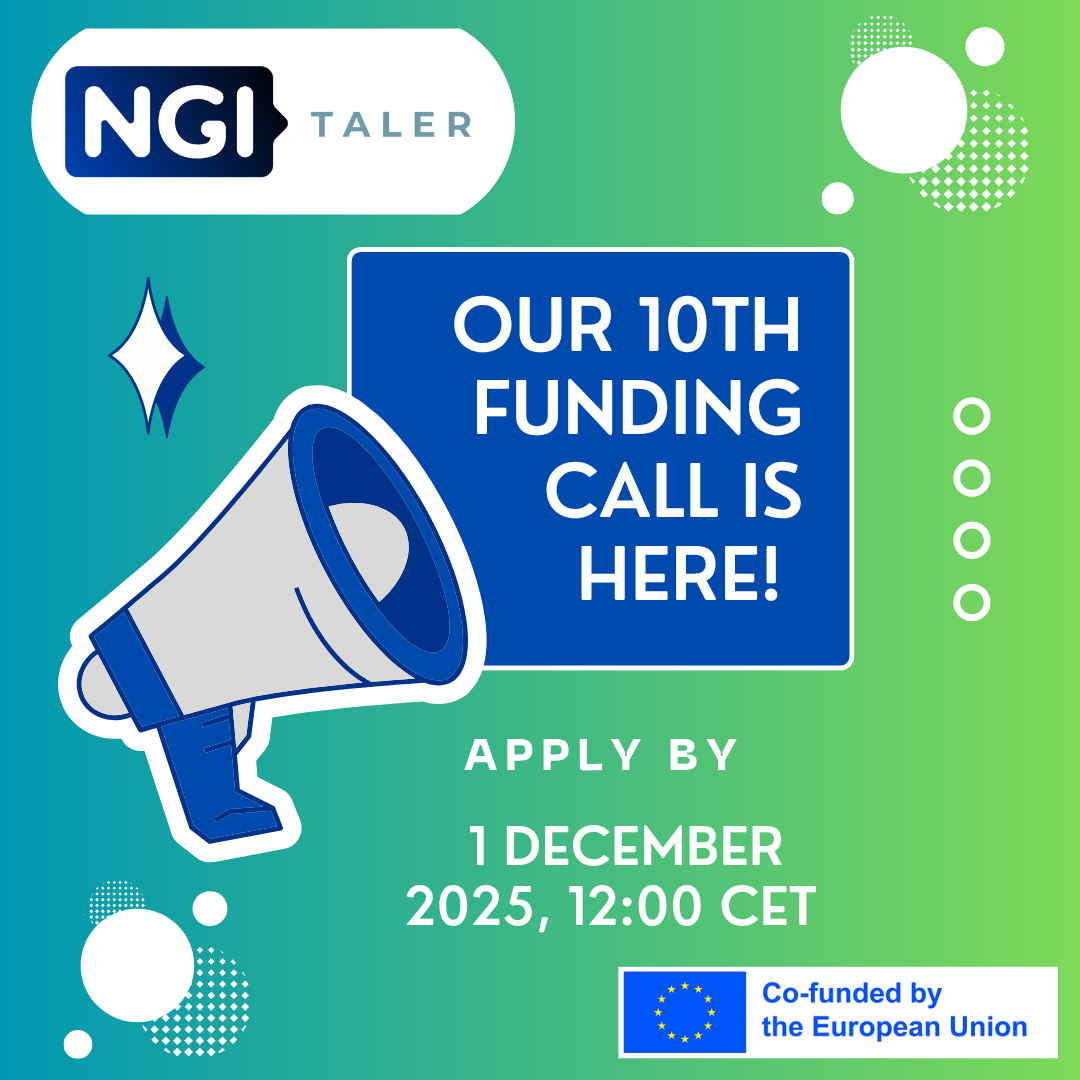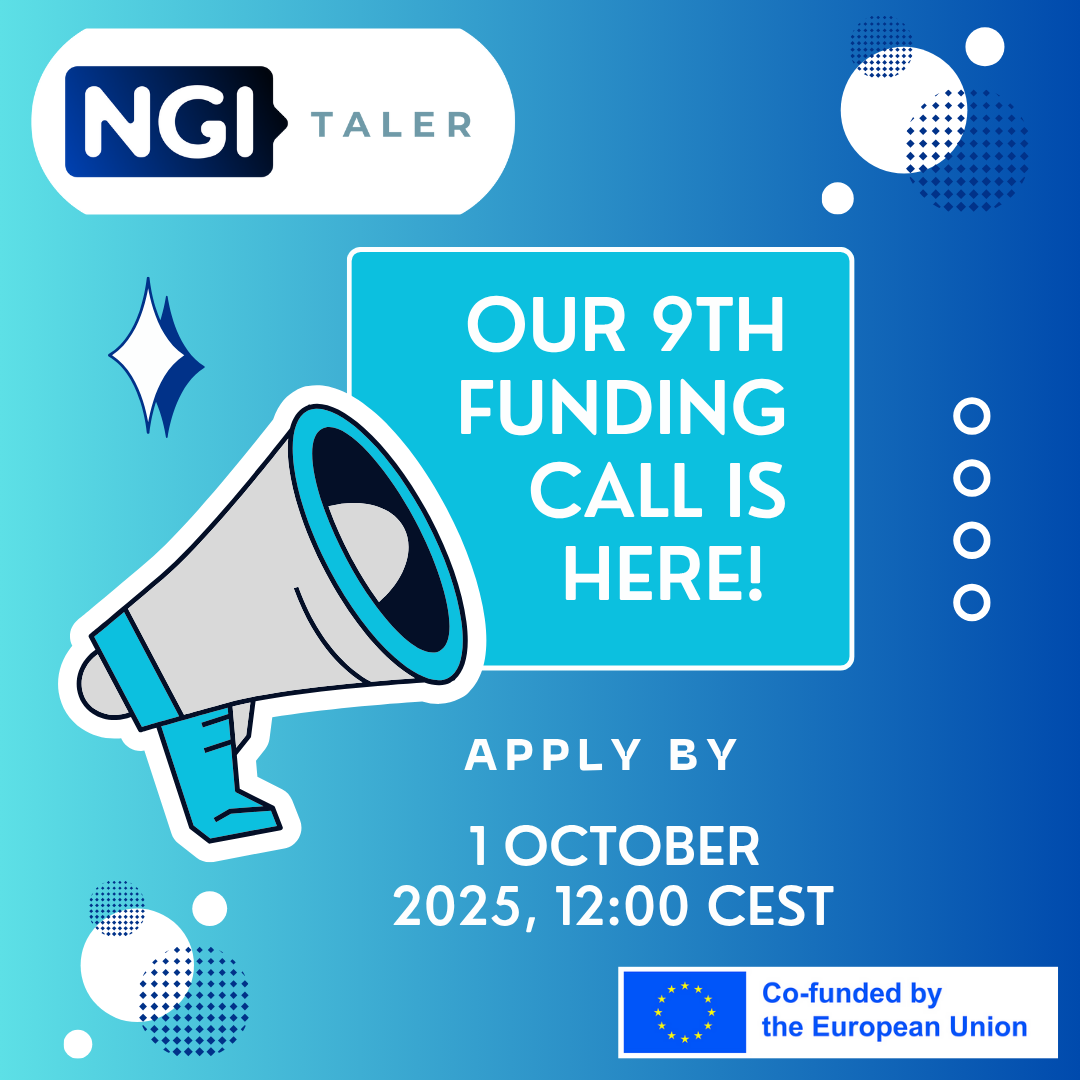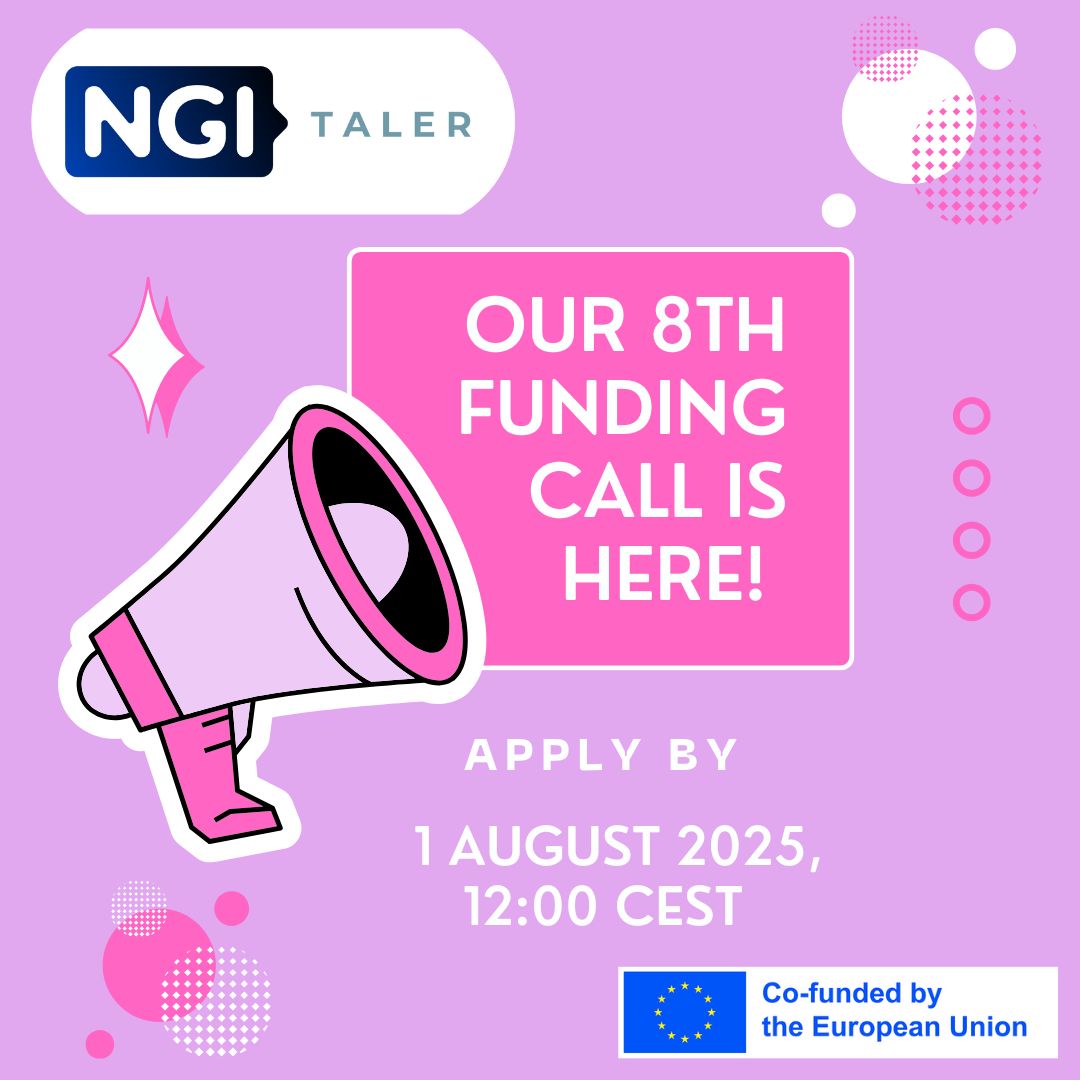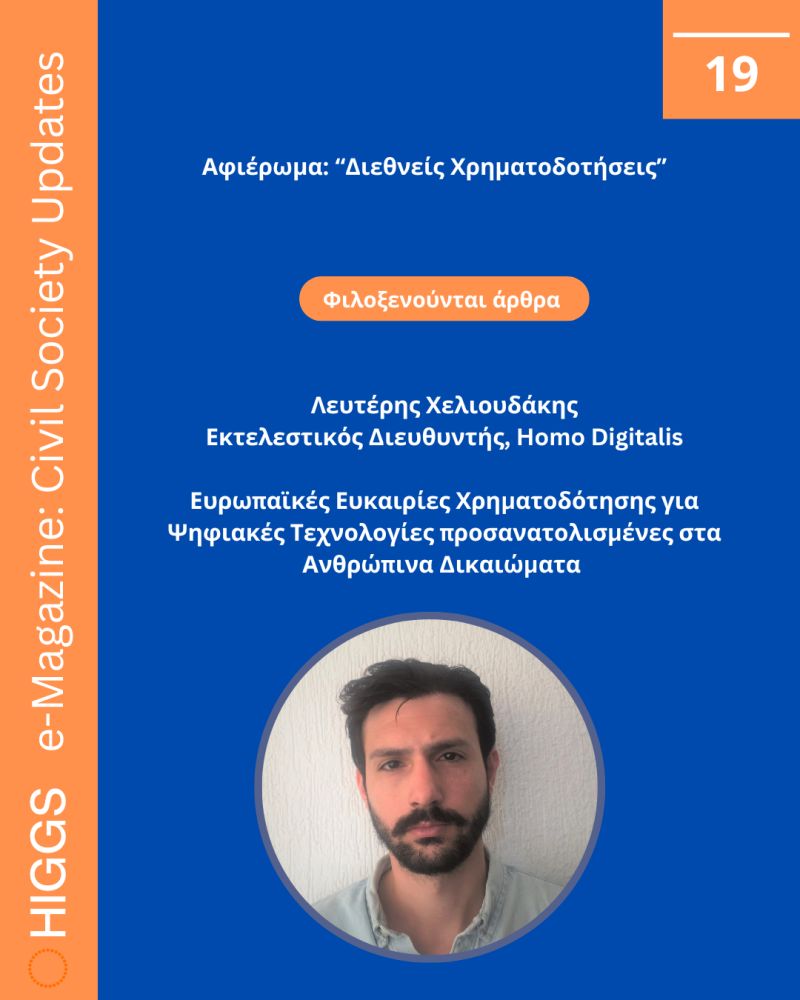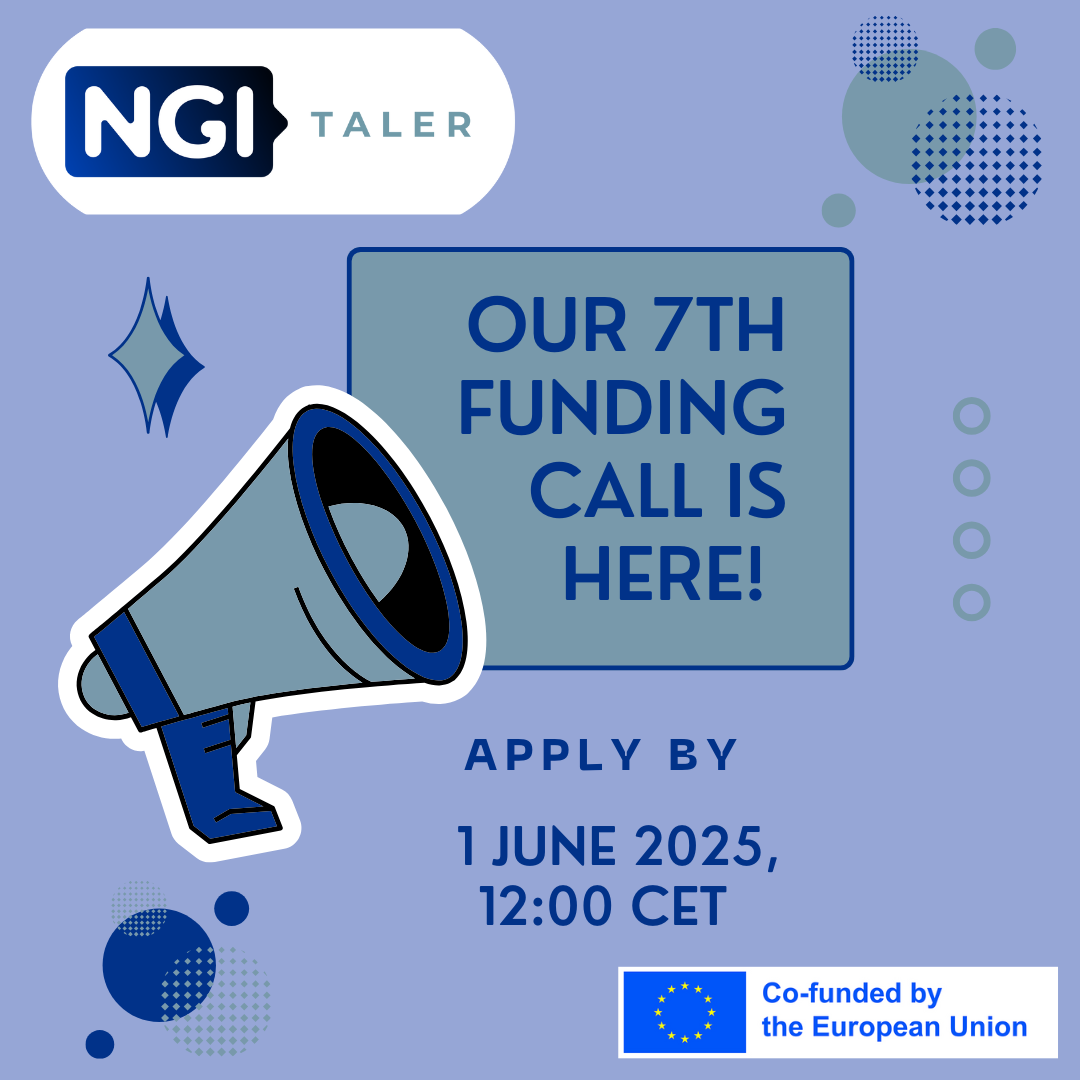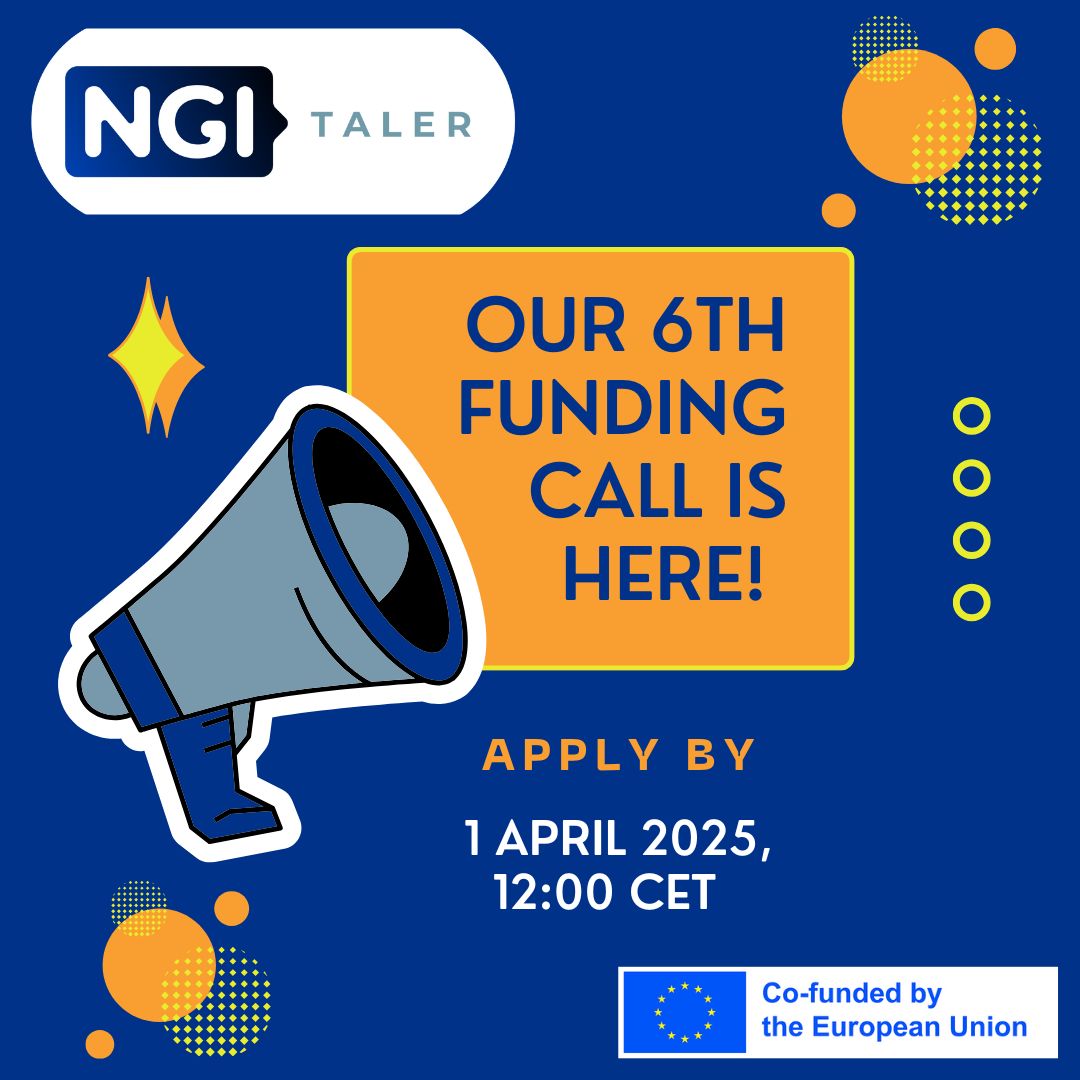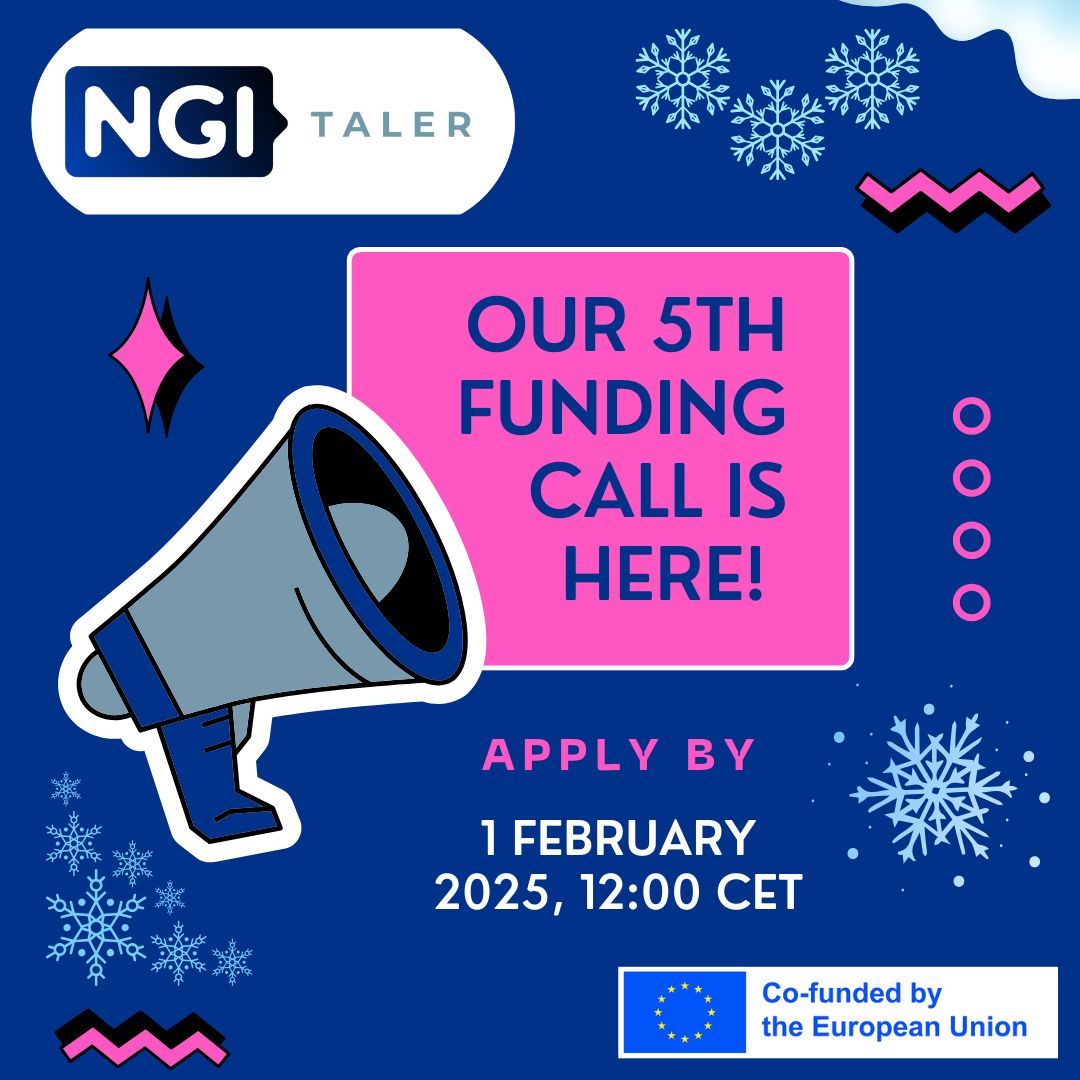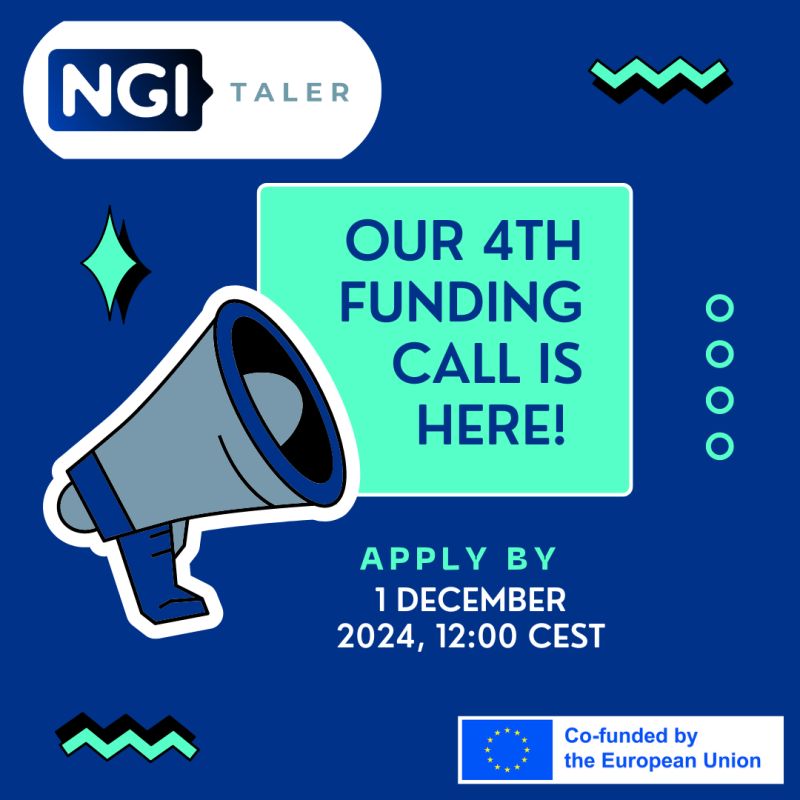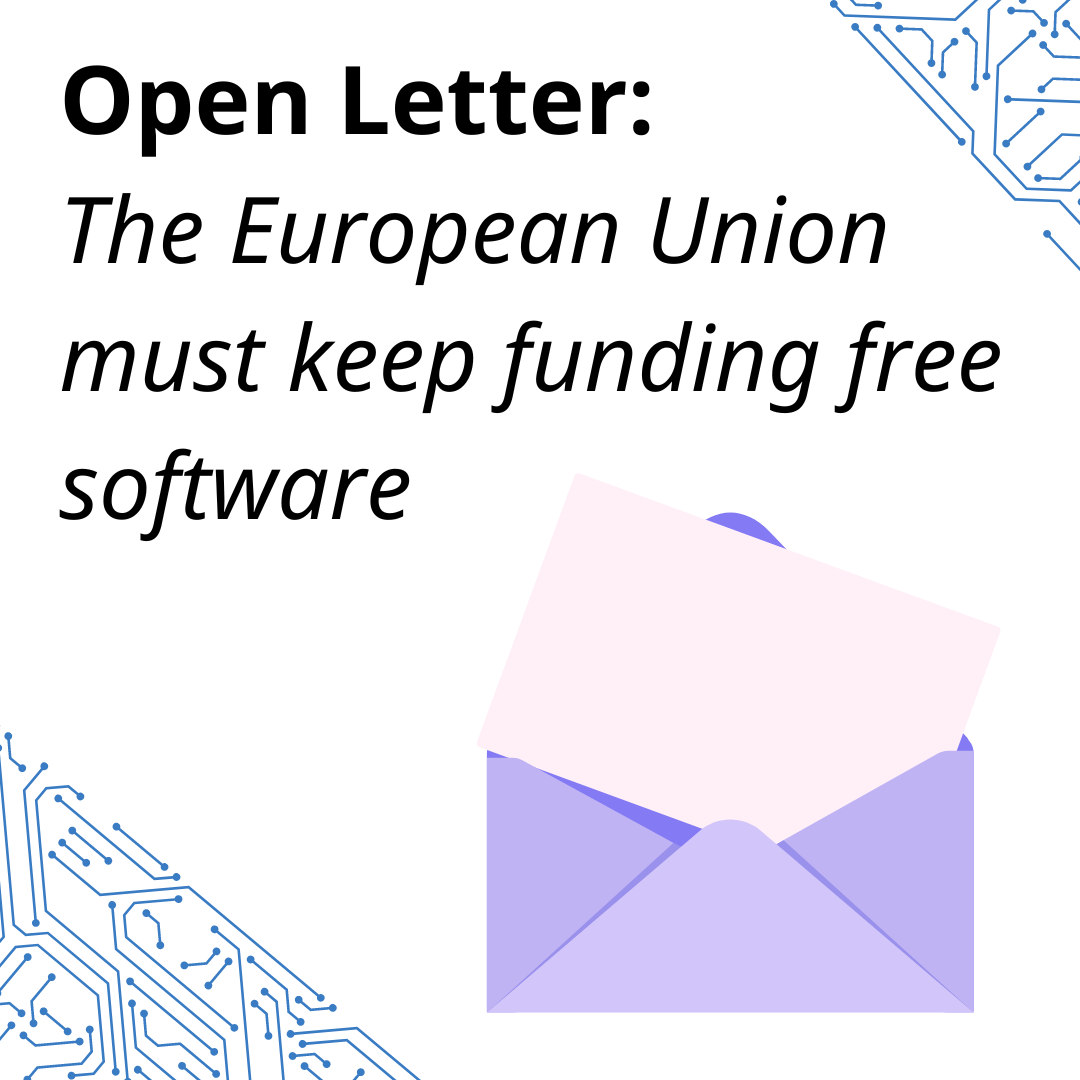The 10th Open Call for Funding of NGI TALER is here!
A short intro about NGI TALER
The NGI TALER project is funded as a pilot under the NGI initiative within the European Commission’s Horizon Europe research funding program. It is operated by a consortium of 11 partners from 8 European countries (Belgium, France, Germany, Greece, Hungary, Luxembourg, Switzerland and The Netherlands) with the mandate to roll out an innovative, best-in-class electronic payment system that benefits everyone: end-consumers, merchants, banks, financial authorities, auditors and anti-corruption researchers! The project builds upon the strong foundations of GNU Taler — the privacy-preserving digital payment system developed by the GNU community and Taler Systems SA with support from the NGI initiative. Read more on NGI TALER’s website, here.
What is this funding call about?
Part of the budget of NGI TALER is reserved for open calls to fund additional free software efforts that are aligned with the topics and approach of NGI TALER. We invite your contributions to help reshape the state of play of digital payment systems, and to help create an open, trustworthy and reliable internet for all! You can contribute exciting new capabilities to GNU Taler itself, build auxiliary tools or work on user experience, but you could also be developing integrations into FOSS applications and open standards, or work on improvements to infrastructure components like merchant back-ends. See more info about the wide range of activities that qualify for financial support and the eligibility criteria here.
How to apply?
The open call is open since 01/10/2025 and the deadline to submit your application is December 1st, 2025, 12:00 CET! You can apply only with proposals between 5.000 and 50.000 euro (60.000 euro is the cumulative absolute hard limit for any applicant for the program). To apply you need to fill in a specific form! From our end we will provide a transparent and efficient selection process. More info in the links below:
The 9th NGI TALER funding Open Call is here!
08/08/2025
The ninth funding call of NGI TALER is here! Make sure to apply until October 1st 2025 12:00 CEST (noon)
A short intro about NGI TALER
The NGI TALER project is funded as a pilot under the NGI initiative within the European Commission’s Horizon Europe research funding program. It is operated by a consortium of 11 partners from 8 European countries (Belgium, France, Germany, Greece, Hungary, Luxembourg, Switzerland and The Netherlands) with the mandate to roll out an innovative, best-in-class electronic payment system that benefits everyone: end-consumers, merchants, banks, financial authorities, auditors and anti-corruption researchers! The project builds upon the strong foundations of GNU Taler — the privacy-preserving digital payment system developed by the GNU community and Taler Systems SA with support from the NGI initiative. Read more on NGI TALER’s website, here.
What is this funding call about?
Part of the budget of NGI TALER is reserved for open calls to fund additional free software efforts that are aligned with the topics and approach of NGI TALER. We invite your contributions to help reshape the state of play of digital payment systems, and to help create an open, trustworthy and reliable internet for all! You can contribute exciting new capabilities to GNU Taler itself, build auxiliary tools or work on user experience, but you could also be developing integrations into FOSS applications and open standards, or work on improvements to infrastructure components like merchant back-ends. See more info about the wide range of activities that qualify for financial support and the eligibility criteria here.
How to apply?
The open call is open since 01/08/2025 and the deadline to submit your application is October 1st, 2025, 12:00 CEST! You can apply only with proposals between 5.000 and 50.000 euro (60.000 euro is the cumulative absolute hard limit for any applicant for the program). To apply you need to fill in a specific form! From our end we will provide a transparent and efficient selection process. More info in the links below:
The 8th NGI TALER Open Call for Funding is Here! Help Us Spread the Word!
Do you have a groundbreaking idea for a free software or privacy-enhancing project that supports the mission of NGI TALER? Did you miss the first seven funding calls? No problem!
The 8th Open Call for funding launched on June 1, 2025, and you have about two months to apply! The deadline is August 1, 2025, at 12:00 noon (Central European Time).
We are looking for proposals that will revolutionize digital payment systems and contribute to an open, trustworthy, and secure internet for all.
Funding amounts range from €5,000 to €50,000! Whether you’re an SME, academic, public institution, non-profit, community group, or individual, we want your innovative ideas!
You can support GNU Taler by:
Developing supporting tools,
Improving user experience,
Integrating with free/open source applications,
Strengthening infrastructure (e.g., merchant subsystems),
And much more!
For more information about this and other calls by NGI – The Next Generation Internet, visit their website.
Read the full Call for Proposals, the Applicant Guide, the Eligibility Criteria, the FAQ, and submit your application through the NLnet Foundation website.
Join the TALER Integration Community Hub (TALER ICH) developed by petites singularités, to ask questions and connect with others.
Need inspiration? Check out 14 successful projects already working with us here.
We Are Featured in the HIGGS Newsletter
The new issue of HIGGS’ Civil Society Updates has just been published! The 19th edition of the magazine is out, themed “International Funding“.
Inside, you’ll find an article by Homo Digitalis, represented by our Co-Founder and Executive Director Eleftherios Chelioudakis, titled: “European Funding Opportunities for Human Rights-Oriented Digital Technologies”.
In this article, we highlight key funding opportunities available for the promotion and protection of Human Rights in the context of new technologies, offered by internationally recognized institutions such as the European AI & Society Fund, the Digital Freedom Fund, and the European Commission through the NGI – Next Generation Internet program.
In fact, funding applications for the NGI TALER project, in which we are a partner, are currently open, with a submission deadline of June 1, 2025!
If you’re interested in securing sustainable funding and strategies that contribute to the long-term viability of the ecosystem, follow this link to learn more!
We warmly thank the HIGGS team for the opportunity to contribute to this new issue of Civil Society Updates!
Through our participation in the Accelerator program, we’ve gained valuable insights, knowledge, and guidance on a range of complex issues!
The sixth open call of NGI TALER is here! Submit your application!
Got a groundbreaking idea for free software and privacy preserving projects that complement our mission as NGI TALER? Missed our first 5 funding calls? No worries!
NGI TALER’s 6th Open Call is live since 1st of February 2025 and you’ve got almost two month to apply. The deadline is 1st of April 2025, 12:00 CET (noon).
We’re on the lookout for proposals that will revolutionize digital payment systems and contribute to an open, trustworthy, and reliable internet for all.
NGI TALER is offering funding between 5,000 and 50,000 euros! Whether you’re a SME, academic, public sector entity, nonprofit, community, or an individual – we want your innovative ideas!
For example, you can enhance GNU Taler by developing auxiliary tools, improving user experience,creating integrations into FOSS applications (think P2P micropayments in instant messaging, social media platforms, or video conferencing tools), or boosting infrastructure components (like merchant backends), to name a few ideas.
For more info about this and other NGI funding calls, you can visit the NGI – The Next Generation Internet’s website here.
You can read the detailed Open Call, Guide for Applicants, Eligibility Requirements, and FAQs on NLnet Foundation’s website here
Last but not least, you can join our TALER Integration Community Hub (TALER ICH) to discuss and get your questions answered here.
Don’t miss out on this incredible opportunity!
NGI TALER is co-funded by the European Union. Views and opinions expressed are however those of the author(s) only and do not necessarily reflect those of the European Union. Neither the European Union nor the granting authority can be held responsible for them.
The fifth open call of NGI TALER is here! Submit your application!
Got a groundbreaking idea for free software and privacy preserving projects that complement our mission as NGI TALER? Missed our first four funding calls? No worries!
NGI TALER’s 5th Open Call is live since 1st of December 2024 and you’ve got almost two month to apply. The deadline is 1st of February 2025, 12:00 CET (noon).
We’re on the lookout for proposals that will revolutionize digital payment systems and contribute to an open, trustworthy, and reliable internet for all.
NGI TALER is offering funding between 5,000 and 50,000 euros! Whether you’re a SME, academic, public sector entity, nonprofit, community, or an individual – we want your innovative ideas!
For example, you can enhance GNU Taler by developing auxiliary tools, improving user experience,creating integrations into FOSS applications (think P2P micropayments in instant messaging, social media platforms, or video conferencing tools), or boosting infrastructure components (like merchant backends), to name a few ideas.
For more info about this and other NGI funding calls, you can visit the NGI – The Next Generation Internet’s website here.
You can read the detailed Open Call, Guide for Applicants, Eligibility Requirements, and FAQs on NLnet Foundation’s website here
Last but not least, you can join our TALER Integration Community Hub (TALER ICH) to discuss and get your questions answered here.
Don’t miss out on this incredible opportunity!
NGI TALER is co-funded by the European Union. Views and opinions expressed are however those of the author(s) only and do not necessarily reflect those of the European Union. Neither the European Union nor the granting authority can be held responsible for them.
The fourth open call of NGI TALER is here! Submit your application!
The fourth open call of NGI TALER is here! Submit your application!
Got a groundbreaking idea for free software and privacy preserving projects that complement our mission as NGI TALER? Missed our first three funding calls? No worries!
NGI TALER’s 4th Open Call is live since 1st of October and you’ve got almost two month to apply. The deadline is 1st of December, 12:00 CET (noon).
We’re on the lookout for proposals that will revolutionize digital payment systems and contribute to an open, trustworthy, and reliable internet for all.
NGI TALER is offering funding between 5,000 and 50,000 euros! Whether you’re a SME, academic, public sector entity, nonprofit, community, or an individual – we want your innovative ideas!
For example, you can enhance GNU Taler by developing auxiliary tools, improving user experience,creating integrations into FOSS applications (think P2P micropayments in instant messaging, social media platforms, or video conferencing tools), or boosting infrastructure components (like merchant backends), to name a few ideas.
For more info about this and other NGI funding calls, you can visit the NGI – The Next Generation Internet’s website here.
You can read the detailed Open Call, Guide for Applicants, Eligibility Requirements, and FAQs on NLnet Foundation’s website here
Last but not least, you can join our TALER Integration Community Hub (TALER ICH) to discuss and get your questions answered here.
Don’t miss out on this incredible opportunity!
NGI TALER is co-funded by the European Union. Views and opinions expressed are however those of the author(s) only and do not necessarily reflect those of the European Union. Neither the European Union nor the granting authority can be held responsible for them.
The European Union must keep funding free software
Open Letter to the European Commission.
Since 2020, Next Generation Internet (NGI) programmes, part of European Commission’s Horizon programme, fund free software in Europe using a cascade funding mechanism (see for example NLnet’s calls). This year, according to the Horizon Europe working draft detailing funding programmes for 2025, we notice that Next Generation Internet is not mentioned any more as part of Cluster 4.
NGI programmes have shown their strength and importance to supporting the European software infrastructure, as a generic funding instrument to fund digital commons and ensure their long-term sustainability. We find this transformation incomprehensible, moreover when NGI has proven efficient and economical to support free software as a whole, from the smallest to the most established initiatives. This ecosystem diversity backs the strength of European technological innovation, and maintaining the NGI initiative to provide structural support to software projects at the heart of worldwide innovation is key to enforce the sovereignty of a European infrastructure.
Contrary to common perception, technical innovations often originate from European rather than North American programming communities, and are mostly initiated by small-scaled organizations.
Previous Cluster 4 allocated 27 million euros to:
- “Human centric Internet aligned with values and principles commonly shared in Europe” ;
- “A flourishing internet, based on common building blocks created within NGI, that enables better control of our digital life” ;
- “A structured ecosystem of talented contributors driving the creation of new internet commons and the evolution of existing internet commons”.
In the name of these challenges, more than 500 projects received NGI funding in the first 5 years, backed by 18 organisations managing these European funding consortia.
NGI contributes to a vast ecosystem, as most of its budget is allocated to fund third parties by the means of open calls, to structure commons that cover the whole Internet scope – from hardware to application, operating systems, digital identities or data traffic supervision. This third-party funding is not renewed in the current program, leaving many projects short on resources for research and innovation in Europe.
Moreover, NGI allows exchanges and collaborations across all the Euro zone countries as well as “widening countries” [1:1], currently both a success and an ongoing progress, likewise the Erasmus programme before us. NGI also contributes to opening and supporting longer relationships than strict project funding does. It encourages implementing projects funded as pilots, backing collaboration, identification and reuse of common elements across projects, interoperability in identification systems and beyond, and setting up development models that mix diverse scales and types of European funding schemes.
While the USA, China or Russia deploy huge public and private resources to develop software and infrastructure that massively capture private consumer data, the EU can’t afford this renunciation.
Free and open source software, as supported by NGI since 2020, is by design the opposite of potential vectors for foreign interference. It lets us keep our data local and favors a community-wide economy and know-how, while allowing an international collaboration.
This is all the more essential in the current geopolitical context: the challenge of technological sovereignty is central, and free software allows addressing it while acting for peace and sovereignty in the digital world as a whole.
